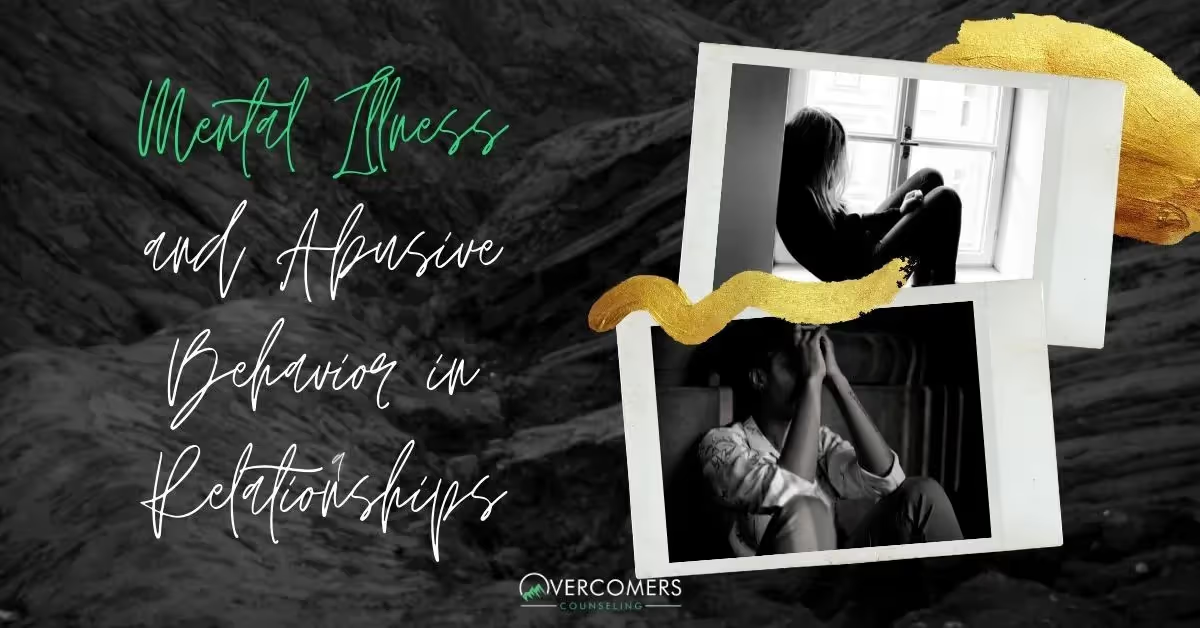It's important to take note of how mental illness can be associated with childhood trauma and learned maladaptive behaviors, but how much of those symptoms...

It's important to take note of how mental illness can be associated with childhood trauma and learned maladaptive behaviors, but how much of those symptoms are attributed to abusive behavior, if at all? It is important to note the distinction between the two that abuse is a learned behavior that comes in many forms. It can be social, economic, physical, spiritual, sexual, racial, and ability-based.
Mental Illness is symptoms experienced that we are not necessarily in control of and can choose to cope with, whereas behavior we are always in control of.
Having a mental illness can also be an emotional manipulation tactic used by abusers.
They essentially receive a 'label' by a mental health professional and automatically believe it excuses them from accountability and responsibility for their past and or current abusive behaviors. It can also be used to gaslight victims and survivors into thinking "that wasn't the person being abusive, it was their mental illness,' which can then lead them back into an abusive relationship they may have previously departed from.
Common mental illness diagnoses where abusive behavior is common are:
While these are serious mental health conditions, it is important to continue to be mindful that mental illness is not a direct cause of abusive behavior. Someone can be angry, sad, or manic and still behave kindly towards their partner, friend, etc.

A lot of times in social settings, abusive partners are very skilled at behaving in ways that do not exemplify or indicate their behaviors that they engage in at home when it is just them and their partner. This can increase difficulty in the victim/survivor receiving validation for their experiences, and if mental illness is present, a lot of times the blame is assuaged onto the diagnosis.
"Oh since your partner is Bipolar, they are probably just manic right now. I would just be extra careful what you say or do so they don't become irritable with you."
Unfortunately, these statements from family and friends can be all too common and further blur the lines between abusive behavior and mental illness.
If your partner has diagnosed with a mental illness and engages in behavior such as
It is important to be mindful of separating those behaviors from emotions/symptoms like irritability, hopelessness, apathy, excessive worrying.People can experience those emotions and symptoms without engaging in the above behaviors, especially if it is a partner or friend who is exclusively targeting you and no one else.
For anyone suspecting that they might be in an abusive relationship, there is an excellent resource in the form of a book entitled, "Why Does He Do That?" by Lundy Bancroft.
If you decide to purchase this book, it is important to make sure your partner does not know about it as it could lead to them to read it in order to manipulate/gaslight or endanger physical safety if you are experiencing physical abuse as well.
Tessa is a great resource in Colorado Springs for those currently experiencing domestic violence/abuse or who have past experiences of it.
The first step is to take responsibility for your actions and apologize. Next, be honest with your thoughts and feelings. Show that you're willing to change and be a better partner. Finally, set some Trust is essential for a happy and healthy marriage. It allows couples to feel safe and secure with each other. Without trust, couples may feel anxious, resentful, and disconnected from one another. to help prevent future hurt. Remember to be patient as it takes time to rebuild trust.
EFT focuses specifically on the emotional bonds and attachment needs in relationships. Unlike other therapies that might focus on behavioral changes alone, EFT addresses the deeper emotional experiences and underlying attachment issues.
For more detailed information, you can visit the official Tricare website or contact a Tricare representative. You can also seek our resources at the defense health agency.
It's possible for therapy to bring up difficult feelings or conflicts. However, this is often part of the process of resolving issues and improving your relationship. It's important to communicate with your therapist if you're finding sessions too difficult.
The length of therapy can vary depending on the couple's needs and the specific issues being addressed. Some couples might find a few sessions helpful, while others may continue for several months.
Yes, Tricare does cover telehealth services, including mental health counseling sessions conducted over a secure video conference.